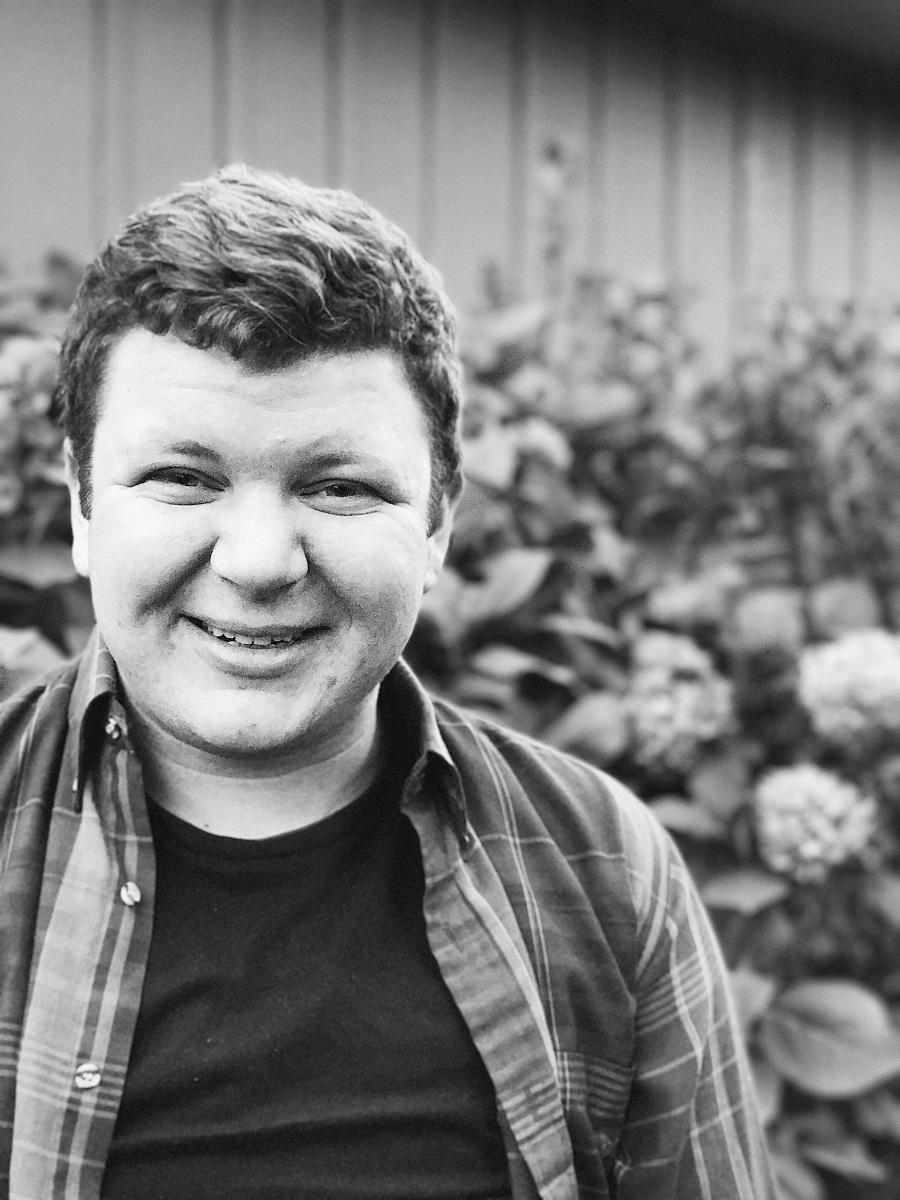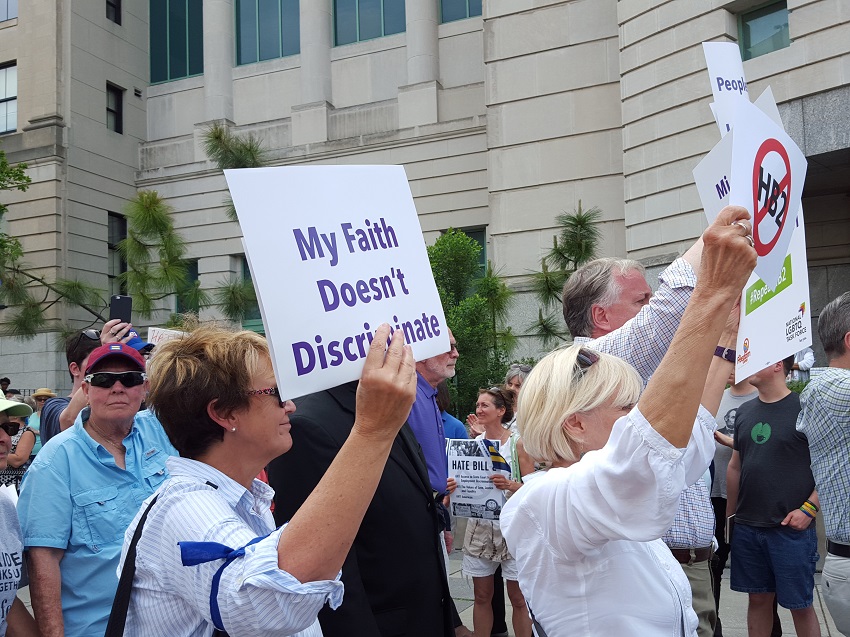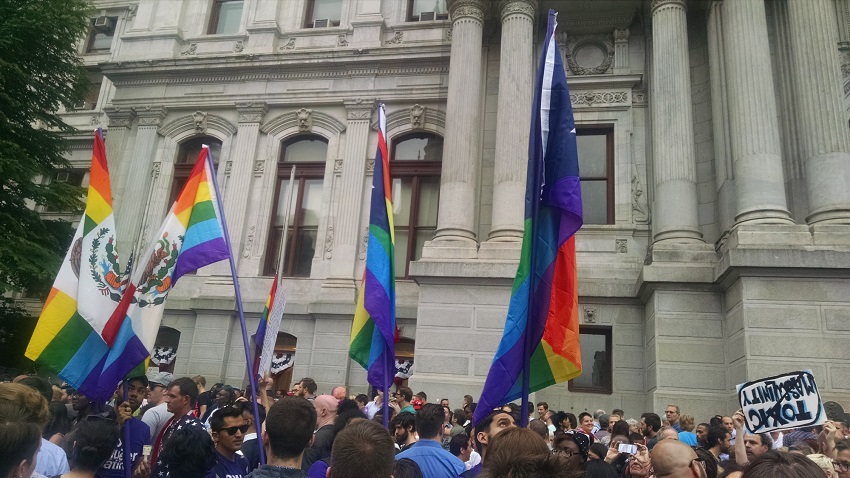
Elijah AFSC
Elijah Walker grew up in Northeast Arkansas, and moved to Portland two years ago to do Quaker Voluntary Service. He stayed on for a second year, the alumni fellowship. He works at West Hills Friends Church, which is a liberal, semi-programmed meeting in Portland. You can hear some of Elijah's messages on the church's Soundcloud page.
Emily McGrew: Tell me a little about your journey to Quakerism.
Elijah Walker: I grew up Missionary Baptist in rural Arkansas. I always felt really drawn to Spirit-led worship, which wasn't really a thing in my church. My journey kind of went all over the place when I came out as transgender when I was 17. My church wasn't affirming. I explored a lot of different denominations at that point, went to an Episcopal church, Disciples of Christ, and a few others ... tried on atheism for about five minutes and that didn't work for me.
A few years ago, I was feeling like it was time to find a church that was a good fit, and a church that could affirm my identity as a trans person, and also my call to ministry. I really didn't know anything about Quakerism at that point, but I was drawn to a Spirit-led worship model, I was drawn to non-hierarchical leadership, and to the peace church tradition, so that led me to Quakerism pretty clearly.
I was living in a town that was about two-and-a-half hours away from the nearest meeting, so it didn't really make sense for me to commute to meeting every Sunday. I tried it out once, and within five minutes of open worship at this unprogrammed meeting in Memphis, within a few minutes I just felt very clear that it was a good fit for me. And at that point, I didn't know about all of the different branches of Quakerism. I was just under the impression that unprogrammed meetings, that was the norm. I basically read everything I could get my hands on about Quakerism, watched QuakerSpeak videos, started learning about Quaker Voluntary Service, and I decided QVS is like the best immersion experience in this practice. I decided to do QVS because I wanted to be a Quaker, which I don't think is the typical experience for QVS fellows.
I moved here to Portland, and fell in love with the Convergent Friends model out here. There are several unprogrammed meetings, and programmed and semi-programmed meetings out here, which all have a relationship together and worship together once a month. I love that model in particular. I fell in love with West Hills Friends. It's been an amazing journey to get here.
Emily: How do you experience Quakerism and your spirituality? What does that look like for you?
Elijah: It's kind of interesting, because at the time of joining QVS and really diving into Quakerism, I wasn't sure how I felt about Jesus and more Christian language around spirituality, but as I've gotten deeper into Quakerism, what I've found is that I'm seeking Christ not as a savior, like I thought when I was a kid, but I'm seeking Christ as a friend and an inner teacher. My spirituality is very much focused on following the leading of my inner teacher, which is Jesus.
Over the past year, part of my work at West Hills is to create a worship group for people who have been traumatized or hurt by the church at large. In that worship group, we call it Fifth Day, we meet on Thursdays, we seek to reclaim the liberating message of Christ. That has been one of the biggest parts of my work and of my spirituality over the past year, reclaiming the message of Christ as liberator, as friend, rather than the oppressor, which I think has been the narrative of American Christianity.
Also, I'm kind of an odd duck in that I am charismatic, and sometimes I might speak in tongues under my breath during open worship. I'm kind of sacramental too. I found myself in open worship at West Hills, and I kept feeling this leading to make the sign of the cross, and I kept saying "No, I'm not doing that, there's no way I'm doing the sign of the cross in Quaker meeting for worship." And I looked over a few minutes later, and the person next to me was doing the sign of the cross. It was hilarious to me. (Hear Elijah preach about this story here). So in my spirituality, I'm more likely to try things outside of what's considered normal in Quakerism. I think that's ok, I think whatever enriches my spiritual life is worthwhile.

Emily: Was there a role that Quakerism and your Quaker community played in exploring your gender identity?
Elijah: I came out as trans when I was 17 and started my medical transition shortly after that. Because of the way the health care system works in our country, and especially the way it worked before Obamacare, I was not able to have chest surgery when I needed to. I wore a chest binder every day that compressed my lungs and did some real damage to my muscles and joints. I had to wait almost seven years to have my chest surgery. I had known for a long time that I felt led to do a year of service, not necessarily QVS but a year of service, and I told myself that I wouldn't do that until I had had my chest surgery, because it felt important to take care of my body and my emotional and mental well-being as well. Finally, in 2015, a friend loaned me the money to have my surgery and a few months after that I moved out here to do QVS.
It's kind of interesting, at that point I thought my transition's done, I won't feel weighed down by the complexity of navigating gender transition in a binary system. But since I had never really addressed the spirituality of my gender transition, when I got here and was affirmed in a really beautifully diverse Quaker meeting, it opened up the floodgates, and I started understanding what it meant to be a trans person of faith in my life and what it would look like to experience that in my body for the first time. It was just a really complex experience. My faith community has been really lovely about affirming that along the way.
My church has been a part of Northwest Yearly Meeting, an evangelical Friends Yearly Meeting. Northwest Yearly meeting is not open and affirming to LGBTQ people, but West Hills Friends came out as affirming, wrote a minute of affirmation for queer and trans people several years ago. Northwest Yearly Meeting basically expelled us from the yearly meeting two years ago, the month before I moved out here, so it was kind of a wild time.
We were officially released two years ago, and then there was an appeals process, and we thought maybe we would be able to mend this relationship. And then in January we were notified we would be officially released and they asked us to form a new yearly meeting with a few other churches that have recently announced that they're open and affirming as well. That has been a really interesting part of my processing what it means to be a trans Quaker, because I'm having really basic conversation sometimes with Quakers, about gender identity, having the most basic trans-101 type conversations that I thought I wouldn't have to have in this context, and trying to justify who I am as a person.
I became Quaker because I needed a faith community that would affirm my identity. West Hills has been solid. If there are ever any people at West Hills who say something that's hurtful, I feel comfortable enough there to explain to them why it's not OK and people are really receptive to that, whereas with this wider body, I'm not really sure. ... There are certainly a few affirming people there, but I'm never really sure what's OK to say and how honest I can be about my journey.

Emily: What can the Quaker community do to support you, as a trans person?
Elijah: What I need is for people to educate themselves before coming to me with their questions. I don't have the energy to answer basic, trans-101 kinds of questions these days.
I also think that there's a tendency when meetings or churches come out and say that they're affirming, there's a tendency to believe the work is done at that point. We've approved a minute of affirmation, so clearly we're affirming, but I think understanding that the work is never done. The work of welcoming and affirming and valuing a person's identity and dignity as a human, that work will continue forever.
For trans people, particularly for trans women of color, but across the board in the trans community, we have worry about physical safety. That is a really traumatic experience. What I would love to see from Quaker communities is to find people who are really deeply invested in helping people recover from that trauma. I think that is spiritual work and communal work, and it’s important work to do.
And then there are really basic, tangible things that can be done. Like at my meeting, we have all-gender restrooms, like single stall, all-gender restrooms. I don't think I had ever been in a building that had labeled all-gender restrooms. Maybe that says something about where I grew up in Arkansas. When I walked into my meetinghouse and saw that for the first time, it let me know that at least I have a basic level of safety here, and that was really helpful for me.
The biggest thing is to not expect trans people in the local meeting to be the sole educator about what it means to be trans. I think that's really important.
Read part 2 of "Quaker and Transgender," an interview with Kody Hersh, here.